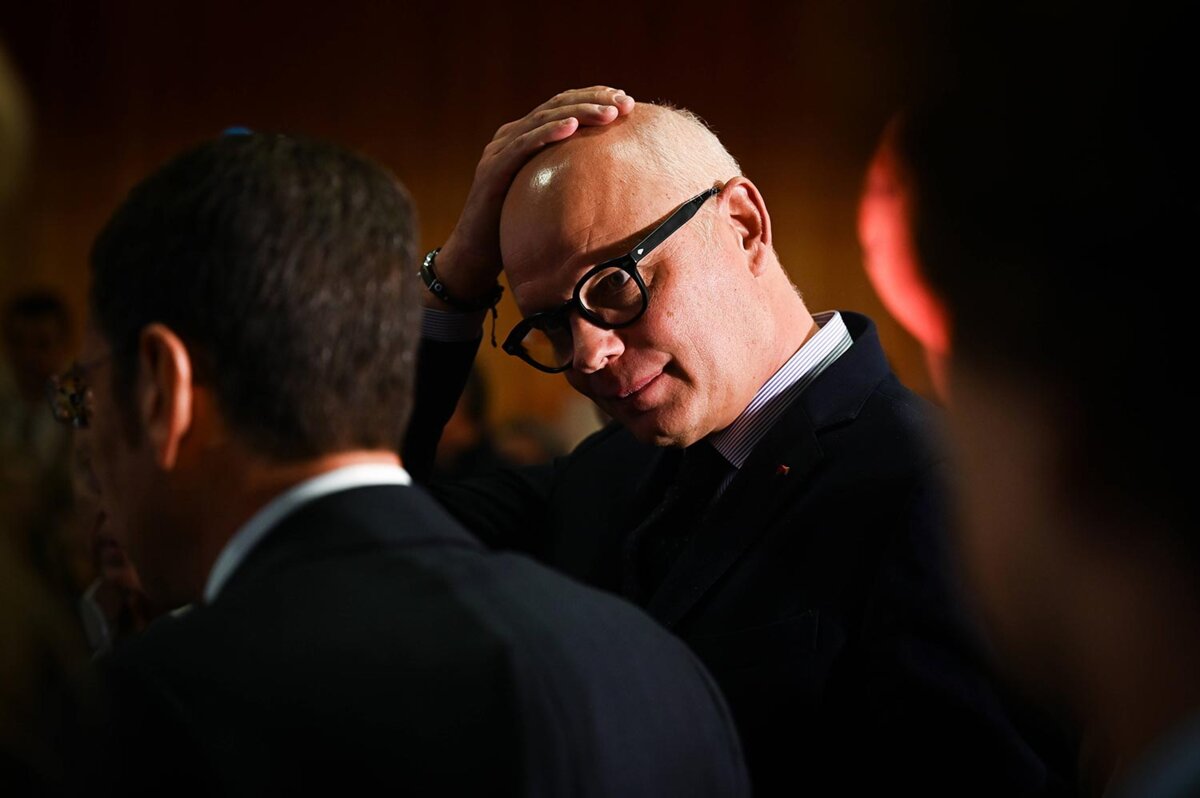The pages of French weekly Le Journal du Dimanche have become a chosen space for politicians who have no qualms in putting about phrases and ideas associated with the far-right.
Earlier this month, it published a lengthy interview with former French prime minister Édouard Philippe, now mayor of the northern town of Le Havre, who after leading Emmanuel Macron’s first two governments has created his own centre-right party, Horizons. Philippe told the weekly that it was “quite possible that there is a new form of anti-white racism, like there is an old form of racism that is anti-black, anti-Arab or anti-Jew”.
It was music to the ears of Marion Maréchal, niece of the far-right figurehead Marine Le Pen, and granddaughter of Front National founder Jean-Marie Le Pen. Maréchal, who is now vice-president of Reconquête, the far-right rival of Le Pen’s Rassemblement National party, and who will lead the Reconquête list of candidates in next June’s European Parliament elections, welcomed Philippe’s comments. “I observe that in words, there is progress,” she said of Philippe’s use of the phrase ‘anti-white racism’, adding: “Édouard Philippe himself uses this term. Darmanin doesn’t appear to oppose it anymore, that’s very good.”
She was referring to interior minister Gérald Darmanin who, speaking on radio station Europe 1, declared that, “I have always thought that an anti-white racism existed,” thus also legitimising the phrase.
Of course, whites can very well be the object of hate, animosity or contempt, as set out in a 2020 essay by Daniel Sabbagh, director of research with the Paris Sciences Po school of political sciences. But that reality is in no way equivalent to the extent of the prejudice targeting black people and those of Arab origin in France, and more generally in the West. It is still less akin to the very different nature of the systemic racism towards the latter groups, one that notably leads from the history of colonialism and slavery.

Enlargement : Illustration 1

The episode concerning Philippe and Darmanin illustrates the ease with which certain phrases of choice of the far-right, rooted in a hateful imaginary, end up being assimilated by the liberal and conservative Right. The notion of “the Great Replacement”, which fuels the racist theories adopted by far-right terrorists, was, little more than two years ago, voiced by Éric Ciotti, in a television interview during his successful campaign to become leader of the conservative Les Républicains (LR) party.
What does this tell us about the current state of France’s rightwing camp, and when did the linguistic crossover begin? For an insight, Mediapart turned to political scientist Émilien Houard-Vial, a teacher with the Sciences Po Centre for European Studies and Comparative Politics, and who is a widely recognised specialist of the contemporary French Right.
-------------------------
Mediapart: Édouard Philippe has adopted the expression “anti-white racism”. How should one interpret this new example of the legitimisation of the phrases of the far-right?
Émilien Houard-Vial: It can be seen as surprising given that Édouard Philippe, during the length of his political career, has rather highlighted liberal themes. A former juppéiste, [editor’s note, a close supporter of former conservative prime minister Alain Juppé], he is regarded as a political leader who comes from the moderate fringes of the UMP [conservative party, now renamed Les Républicains].
But the term “anti-white racism” had, precisely, been taken up in 2012 by the then president of the UMP, Jean-François Copé, in his ‘Manifeste pour la droite décomplexée’ [manifesto for a Right with no complexes]. By the way, even people from the Left, like Bernard Kouchner, were able to sign a call in 2005 against “a new form of racism”. The circulation of this term outside of the far-right, therefore, is quite old. It is nevertheless a fact that today it is clearly appropriated by Éric Zemmour.
By adopting it a short time after criticising “immigration by fait accompli”, and having placed in question the 1968 French-Algerian agreements on migratory issues, Édouard Philippe sends a signal to those on the Right that he is… really on the Right. Concerned with not appearing like a simple heir to Macron-ism, he’s looking for a half-way house between the latter and his former friends who remain with LR.
Mediapart: Beyond the term “anti-white racism”, politicians on the Right have been heard talking about “the Great Replacement”, about “French by papers”, and “en-savagement” (1). Has the adoption of far-right terms intensified over recent years?
E.H-V: One can find examples that show that the process is not new, whether that be the laws of [Charles] Pasqua and [Jean-Louis] Debré [editor’s note, conservative government interior ministers] in the 1980s and 1990s, or the rupture introduced by Nicolas Sarkozy around 2007. Despite that, the Right had for long distinguished itself from the far-right by the refusal of essentialism and indentitarianism. It supported what were certainly restrictive positions on immigration, but it justified these at a “pragmatic” level and not by painting foreigners as people who threaten society at an existential level. The works of [French political scientist] Colette Ysmal carried out before the 2000s confirm that rightwing [conservative] supporters were clearly more attached to universalist values than those who supported the far-right.
Things evolved under Nicolas Sarkozy, and then Jean-François Copé and Laurent Wauquiez [successively chairmen of the conservative party: Copé when it was the UMP, Wauquiez when it was renamed LR], but there were other personalities who acted as a counterpoint within the party, like Alain Juppé or Nathalie Kosciusko-Morizet, or even [the party’s 2022 presidential candidate] Valérie Pécresse, who said they remained in order to represent a non-identitarian line. Since then, some among the more moderate party cadres have defected, and the necessity to make a distinction from Macron-ism was felt more strongly, and the militant grass-roots has increasingly called for the most hardline political-speak.

Enlargement : Illustration 2

That is why, beginning three or four years ago, we are looking at a qualitative change, which was established with the arrival of Éric Ciotti as the head of LR. A threshold was crossed. It translates by the centrality and radicality of a rhetoric according to which a majority and native population sees itself threatened – at a cultural and symbolic level as well as in its physical integrity – by Islamism and, more generally, by minorities that are both non-assimilable and ‘decivilised’.
The result is that today, LR officials rise up on social media against a minister who denies the “obvious” link between delinquency and immigration, and this without any form of consequent opposition within the party.
Mediapart: By force of taking up the ethno-centrist and authoritarian vocabulary of the far-right, what in substance still distinguishes the LR from the latter?
E.H-V: On those issues, it’s become increasingly difficult to discern. The differences have become ‘meta-ideological’ in the sense that there is no more fighting over the issues, but rather over the manner of defending the arguments. That’s what Éric Ciotti does when he explains that the LR is the Rassemblement National [RN] in a more competent form. The added value of the Right would be that it is better placed to enact its programme. That joins with a political culture that further distinguishes itself from the RN, and in which its cadres have been socialised: a culture of a party of government, of people who know how to ‘behave’ in order to concretely exercise power.
Even the question of national preference, the plinth of the RN’s subversive identity in the republican camp, is no longer so discriminating. When LR demand a five-year delay before foreigners can receive certain social benefits, or when it argues for a “community preference” so as to include Europeans, this involves polished versions of far-right ideas. That they [the conservatives] don’t go as far as adopting them just as they are shows that there remains a sort of taboo.
Strategic reasons also come into consideration. To have exactly the same programme would open up the risk of a further electoral haemorrhage in favour of the RN. In fact, even Ciotti sticks to a line that refuses an alliance with the far-right, at least for the time being.
So, one cannot say that LR and the RN propose exactly the same thing, even if factually the positions are evermore closer. To take another example, some people in LR call for the removal of birthright citizenship, or also a moratorium on immigration – a manner of drawing closer to Marine Le Pen’s “zero” immigration.
Mediapart: There have been numerous studies that show that competing with the far-right on its own territory is a mistaken strategy in the medium- and long-term. In France, is there a probability that the conservative opposition will become aware of this and attempt a different approach?
E.H-V: LR has so much criticised the “limp Right” and the “rightwing of the Left” that it seems to me difficult to implement a reversal. During the [parliamentary] debates over the motion rejecting the draft legislation on immigration, its Members of Parliament painted Darmanin as an “immigrationist”. A lot of the moderate electorate have already been dissuaded by the evolution of the language.
The party cadres are well aware that a very large number of those who voted in 2017 have enduringly moved over to the camp of Emmanuel Macron. For the moment, their response is reduced to representing an opposition that wants to be seen as reasonable, by occasionally recognising the merit of the [French] president.
Figures like [LR Member of Parliament and former secretary general of the party] Aurélien Pradié try to think of a dignified way out of the dilemma between ‘Macronism’ and ‘Lepenism’ – or ‘Zemmourism’. According to that view, LR should champion new issues, in line with the major preoccupations of the population, notably of those living in urban peripheries or rural areas abandoned by the state, which are lacking public services. These issues could be the subject of a line that mobilises the traditional values of the Right, like merit.
That is what senior civil servant Emmanuelle Mignon tried to do under Nicolas Sarkozy, and it should be noted that she has just taken up service again within LR where, with the rank of vice-president, she heads the “ideas” section of the party.
But how can this work be carried out when Éric Ciotti insists that the priority lies in the battle against wokeism and civilisational decline? Or when some are waiting for the collapse of ‘Macronism’, telling themselves that Laurent Wauquiez could appear as if a Gaullist saviour? The party has still not collectively analysed why the Sarkozist strategy worked in certain conditions in 2007, and why it failed on three occasions afterwards.
----------
1: French interior minister Gérald Darmanin, in an interview in 2020 with French daily Le Figaro, declared that, "The en-savagement of a certain section of society must be stopped". The term ‘ensauvagement’ is defined by one of the French dictionaries of reference, Le Petit Robert, as meaning, variously, the “behaviour of a person who lives outside of human society”, a “return to a non-domesticated, wild and natural state”, and figuratively as “descending into wildness, barbarianism, violence”. It is a phrase coined by the far-right, and has obvious ethnic and racial connotations.
-------------------------
- The original French version of this interview and introduction can be found here.
English version by Graham Tearse


